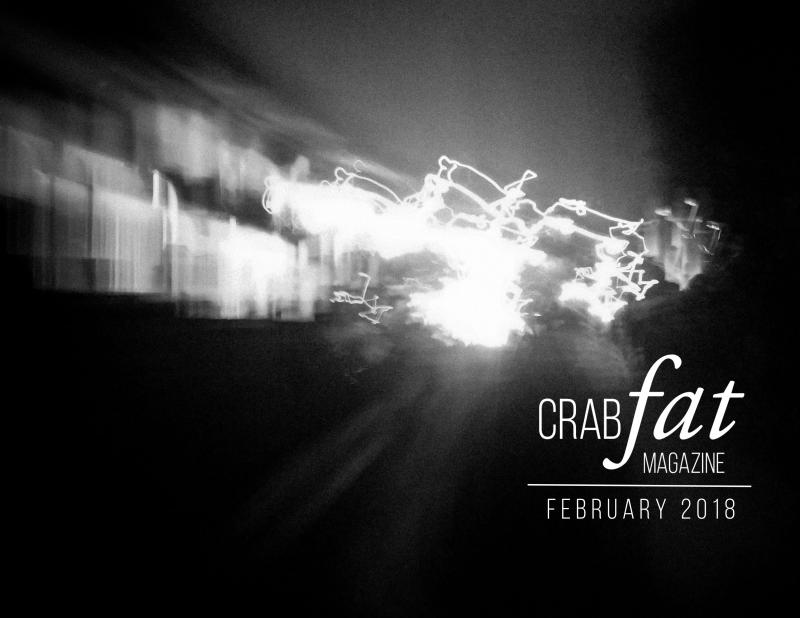Crab Fat Magazine – February 2018
I was more than excited to dive into the February 2018 edition of Crab Fat Magazine. This journal is available online for free, making it super accessible, and much to my elation upon entering the website, I was greeted by a welcoming little gif sticker that flashes between statements of inclusivity like “This journal is queer positive” and “This journal is asexual positive.” The journal actively seeks out the writing of marginalized folks.
I was more than excited to dive into the February 2018 edition of Crab Fat Magazine. This journal is available online for free, making it super accessible, and much to my elation upon entering the website, I was greeted by a welcoming little gif sticker that flashes between statements of inclusivity like “This journal is queer positive” and “This journal is asexual positive.” The journal actively seeks out the writing of marginalized folks. On their submissions page they write:
Please submit to us if you are a POC, a queer/trans person, a disabled person, a woman, femme, nonbinary person, a neurodivergent person, a trauma survivor, a nonreligious, atheist, pagan person, or any other person that is often underrepresented in media. We want to make space for you.
Feeling sufficiently safe and cozy, I settled in to read through the journal and found myself immersed in quite a few familiar topics like anti-capitalism and the metaphysical. There were connecting threads between the poems featured in this edition, building a wonderful sense of community and strength in diversity among marginalized writers.
One idea I found particularly interesting was the way these writers look at their ancestry. Our parents and grandparents often lived very different lives with much stricter gender roles than we create for ourselves, leading to a disconnect. Stephanie Lane Sutton’s poem “Kiki de Montparnasse Moves to A Room of Her Own” features a grandmother who, “once slapped a Prussian for pinching / her thighs. She laughs when she tells it, A different war, back then.”
Chestina Craig’s poem, “alternate universe where my Grandmother does not burn to death in Her kitchen cooking breakfast for a man,” meditates on the patriarchal expectations forced on a woman who lived and died by them. The speaker opens with the lines:
alternate universe where my Grandma
sleeps for a change, wallows
in bed like the youth
She gave up.
The speaker—who also mentions sports games and graduations the grandma has missed since death—is living that youth their grandmother could never have. This alternate universe indicates the speaker is so haunted by that unnecessary loss they create an alternate narrative where: “She does not become salem catching up with my family.” We wonder how these women survived, how they endured day after day, and they fuel a fire in us that propels us forward in our own difficult lives.
References to witchcraft, the metaphysical, and divination also caught my attention in this edition. Chestina Craig’s poem described her grandmother as a “witch that refuses to swing.” In Lydia Stucki’s piece, “Accidental Photographs,” they (for authors whose bios that don’t contain otherwise specified pronouns, I’ll just use the neutral they) write, “pouring honey from her soul to mine like a painkiller. We wove rings of runes round cups of chamomile, secretly binding eggs to oil and water with that brown powder from a cardboard box.”
In Elizabeth Theriot’s poem “Briseis Dream of Ships,” she writes of burning sage. The poem contains gorgeous natural imagery that surreally influences the body: “The sky is supple lambskin. Wraps me fetal, / unrolls me / over marble floors.” This turn to the spiritual, New Age alternatives to traditional religion has been not only prevalent in poetry, but is all over social media as well. Astrology twitter accounts are a dime a dozen and who doesn’t love an aesthetic blog photo of a quartz point charging in the sun? It seems like people are more interested in internal power. The grandmother in Craig’s poem had it in her, but she just couldn’t swing.
The fiction of this edition of Crab Fat Magazine is equally charged and interesting. Krys Malcolm Belc tells the story of a trans student at a Catholic girls’ school. Laura McGehee’s short story “You Need to Pee” explores recovering from heartbreak through a series of instances in which the protagonist really inconveniently needs to pee. Celeste Smith’s “Orgasm Quest” is exactly what you think it is: the all too common quest to achieve orgasm in the face of patriarchy and pharmaceuticals that minimize sex drive.
As Crab Fat Magazine states on their submissions page, they want to make space for you. Their journal celebrates and highlights the wonderful work of marginalized individuals. The February 2018 edition made me laugh and cry, and as a queer person, I felt like it has its finger right on the pulse of what marginalized folks are thinking and talking about. We’re looking for strength, storytelling, and community. We’re a bunch of witches who are refusing to swing.
[www.crabfatmagazine.com]






